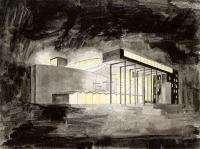delwara community toilets
Delwara, India
The village of Delwara is a small, peri-urban settlement located 28 km fromUdaipur, Rajasthan. The villagers work primarily on small agricultural plotsadjacent to their homes. Several commute daily to Udaipur for work. Few of thevillagers have access to toilets within their residence. The development of basicsanitation infrastructure such as plumbing and sewage disposal is absolutely critical for Delwara. This project sought to create the fundamental infrastructure required for a community toilet – the first of its kind in the town. Given the scarcity of water in the desert and the high levels of ground-water contamination from septic tanks, a dry-composting prototype was selected as the optimal model for this site. Incorporating rubble masonry for walls, and a bamboo framing system for the roof, the design emphasizes an aesthetic of non-industrial materials crafted by local artisans.The scale of this project was determined by the limitation of semi-skilled and skilled craftsmen working entirely by hand - the villagers are skilled in stone masonry and carving and proposed to participate in the construction. Our design sought to embed this project within the available technology and traditions of Delwara’s citizens.
The site for the toilets was selected with the consent of the Delwara community. Its proximity to the state highway, the village bus stop, and the local clinic shall ensure active use of the facilities by the entire village. The dry composting toilets are entirely self-contained: all urine and wastewater is directed into evaporative plant beds. Solid waste, collected in bins, is desiccated to make fertilizer. Rainwater runoff from the roofs is collected in cisterns and gravity fed to washbasins in the toilets.A shaded central plaza anchors village gatherings adjacent to the community toilet. Rainwater collected from the roofs is directed into concrete cisterns containing sand and charcoal filters.














